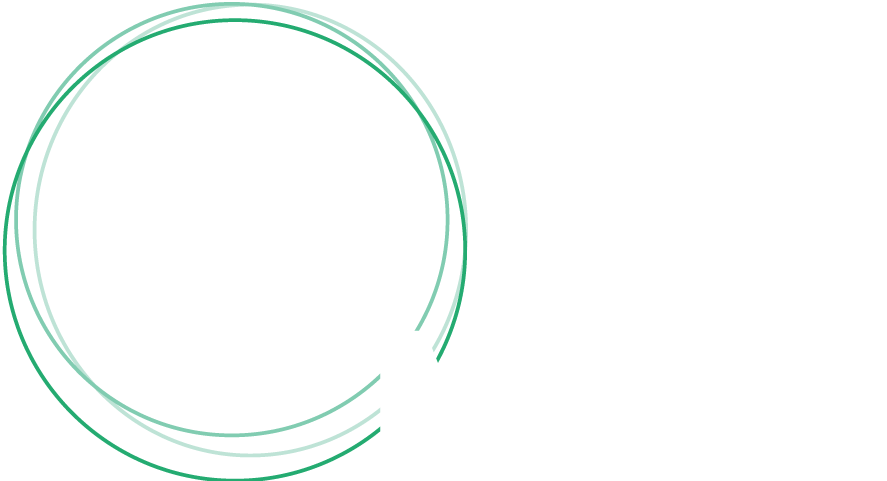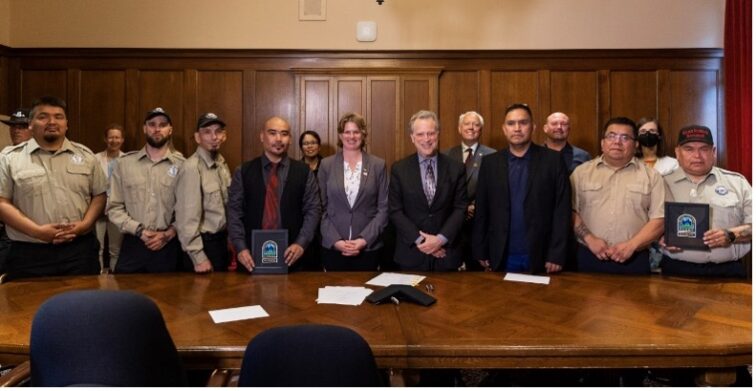
The Memorandum of Understanding signing ceremony.
“It’s something we’ve always been working towards.”
Those are the words of Ernie Tallio, Guardian Watchmen Manager for the Nuxalk Nation on BC’s Central Coast. He’s talking about an agreement between the Nuxalk and Kitasoo Xai’xais First Nations and BC Parks to share compliance and enforcement responsibilities within provincial protected areas in the Nations’ territories. The Shared Compliance and Enforcement Pilot Program officially launched in July 2023 with five Nuxalk and six Kitasoo Xai’xais Guardians receiving park ranger appointments.
“It’s exciting to be part of this initiative… to be part of something that’s a first in Canada,” said Ernie. “It’s taken several years to get to this point and a lot of collaboration with BC Parks. We were often told by government agencies we work with that we didn’t have any authority but now we do.”
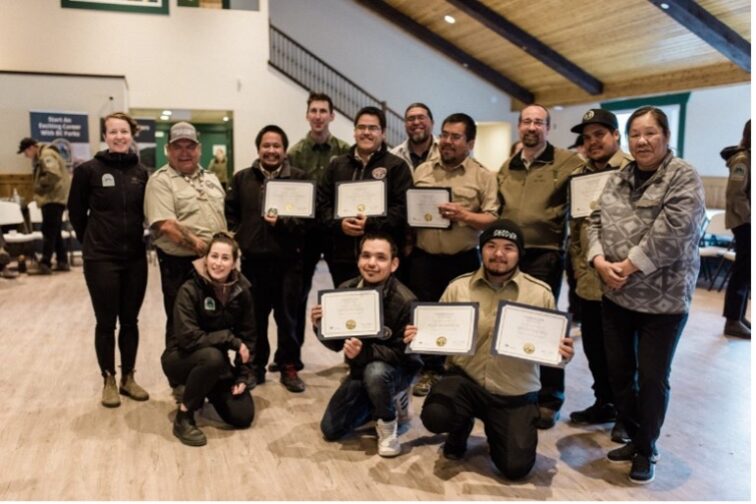
Guardians with their bootcamp certificates.
The 11 Guardians with park ranger appointments have the same powers under the Park Act as park rangers employed by BC Parks in more than 40 protected areas, including Tweedsmuir Park, the Fiordland Conservancy, Kitasoo Spirit Bear Conservancy and Dean River Conservancy. They can give warnings or issue tickets for infringements of the Act. Among other training, each has taken BCIT’s BC Parks Law and Its Administration course and participated in a two-week ranger bootcamp at Manning Park.
The agreement between BC Parks and the Nuxalk and Kitasoo Xai’xais is a recognition that these Central Coast Nations have sustainably managed resources in their territories for thousands of years.
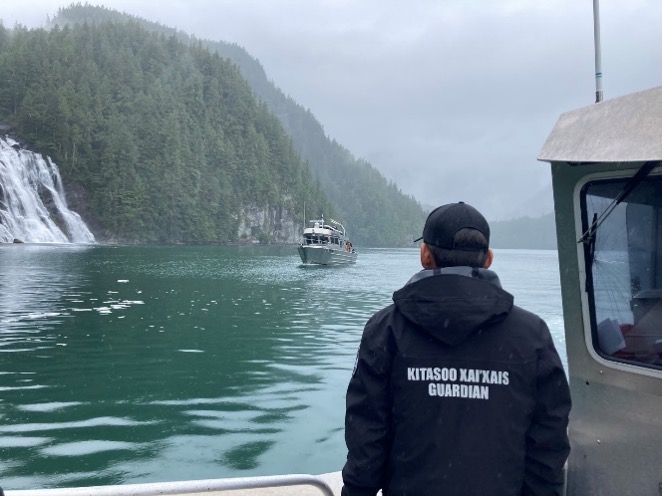
Kitasoo Xai’xais Guardian in the field.
“This is an incredibly important step towards reconciliation,” said Dana Holtby, an advisor with the BC Parks’ Indigenous Relations Team and part of the technical working group for the pilot. “It’s a unique moment when the Crown has recognized the authority, capacity, and capability of the Guardian programs. It’s a recognition of the role Guardians have played in stewarding their territories for generations. People in these communities are incredibly proud of the work the Guardians are doing.”
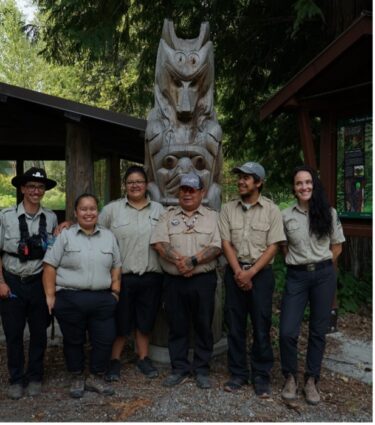
Nuxalk Guardians and BC Parks rangers.
BC Parks has been collaborating with both Nations for two decades, working side by side on park management planning and through joint training and patrols. MaPP has also played an important role in creating space to allow a strong and trusting relationship to grow. The organization hosted a communication workshop for BC Parks operational staff and Guardians in 2018 as well as joint training to foster a more collaborative approach to monitoring the Central Coast. Another communication and collaboration workshop was held in 2019 and MaPP also funded Guardians to take part in BC Parks ranger training in Williams Lake.
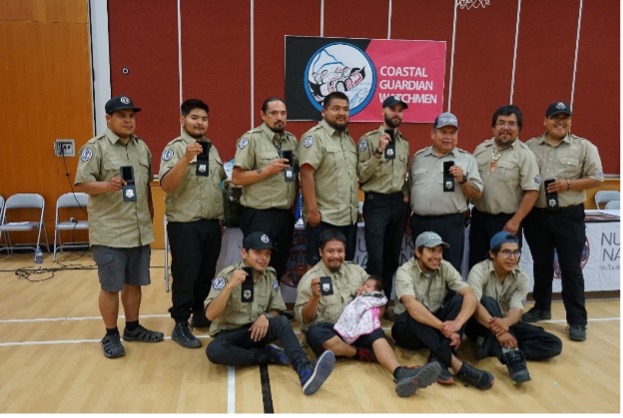
Nuxalk and Kitasoo Xai’xais Guardians with their park ranger badges.
MaPP is committed to providing ongoing coordination and support for compliance and enforcement. This contributes to numerous objectives and strategies of the Central Coast Marine Plan including improving marine-based compliance monitoring, and minimizing current and potential ecological impacts of logging-related activities. Over time, MaPP expects the pilot project will build First Nations’ capacity for compliance and enforcement, increase respect for the authority of First Nations’ Guardian programs, improve understanding, communication, and collaboration between provincial agencies and First Nations, and ensure compliance with marine laws on the Central Coast. Collaborative stewardship will result in improved Central Coast Marine Plan outcomes. MaPP also hopes the program will serve as a path for other Nations seeking greater authority to manage and make decisions regarding their territories.
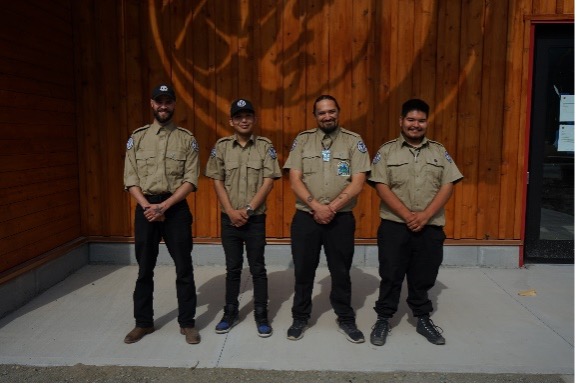
Kitasoo Xai’xais Guardians.
“This work is serving as an inspiration for other Nations,” said Ernie. “I attended an Indigenous Leadership Initiative gathering in Ottawa in spring 2023 and there was definitely interest in what we’re doing.”
“There are a lot of eyes watching this pilot,” added Dana. “We’re excited to continue to build the partnership between BC Parks and the Kitasoo Xai’xais and Nuxalk Nations, and to see where this pilot leads us.”
